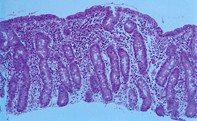Peer Reviewed
Feature Article Paediatrics
Investigation of the child with failure to thrive
Abstract
Poor weight gain is a common complaint in paediatric practice.
Key Points
- When assessing a child with presumed growth failure, confirm on a percentile chart that the weight gain has been abnormal. The crossing of two major percentile lines or a fall below the third percentile is considered abnormal.
- Consider poor feeding technique, errors in formula preparation, emotional neglect or even child abuse. If one of these nonorganic causes is suspected, assess growth pattern after education and dietary interventions, and defer extensive investigations.
- The organic causes of failure to thrive can be divided into: failure of intake, abnormal losses, failure of utilisation, increased requirements, and reduced growth potential.
- When considering organic causes, it is useful to look at whether there is persistent vomiting, gastro-oesophageal reflux, chronic diarrhoea or malabsorption.
- With a detailed physical examination and a few simple screening tests, a provisional diagnosis can often be made, but the child should be referred to a specialist if there is no weight gain despite dietary interventions or if serious disease is suspected.
Purchase the PDF version of this article
Already a subscriber? Login here.

